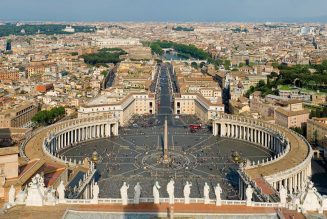This Sunday, the First Sunday of Lent Year A, is all about three different encounters with the devil: First, the one in the Garden of Eden; second, the one in the desert — and, third, the one you just entered into this Lent.
The lesson: Be like Jesus — and not like Adam and Eve.
First, notice that Adam and Eve are tempted after enjoying abundance; Jesus overcomes temptation after fasting.
Adam and Eve, before the fall, had every right to enjoy the abundance of the Garden of Eden. But today’s first reading, from Genesis, hints at one problem in their enjoyment.
When Genesis describes the good fruits of the garden, we learn that they “were delightful to look at and good for food.” When Genesis describes how Eve fell for the forbidden fruit, we learn that she saw it in the same way, and with a new twist: it “was good for food, pleasing to the eyes, and desirable for gaining wisdom.”
Eve was giving her appetite too much say in how she was sizing up that fruit.
Jesus shows us how to avoid the problem: He goes to the other extreme from the abundance of the Garden of Eden — a desert.
“It is fitting that it be recorded that the first Adam was cast out of Paradise into the desert, that you may observe how the second Adam returned from the desert to Paradise,” said St. Ambrose.
In the Gospel’s great understatement, we learn: “He fasted for forty days and forty nights, and afterwards he was hungry.”
Jesus was indeed hungry — but he was also disciplined. So when Satan tempted him to turn stones into bread, he was ready. And it turns out that the amount of hunger a person has isn’t the point — their amount of self-control is. Rather than admiring the beauty of food, Jesus had spent 40 days conquering his appetites, and so he stood up to the devil easily.
Second, Adam and Eve (and Satan) bend God’s words to their ends; Jesus lives God’s words.
Eve has a thin grasp on God’s word. God had told her, earlier in Genesis chapter 2: “You are free to eat from any of the trees of the garden except the tree of knowledge of good and evil. From that tree you shall not eat; when you eat from it you shall die.”
But Eve misreports his words when she shares what he said with the serpent: “God said, ‘You shall not eat it or even touch it, lest you die.’”
God never said that touching the fruit would make her die. She has reinterpreted God to make him sound unreasonable. This is a first step toward rejecting God.
In the second temptation of Christ, Satan tells Jesus to leap off a tower and be saved by God. He quotes Psalm 91 which tells God’s people that, if they do his will, “He will command his angels concerning you and with their hands they will support you, lest you dash your foot against a stone.” Satan childishly reinterprets that to mean, “No matter what you do, God will save you.”
But Jesus knows that God is a Father who has mercy on his children to help them do his will; he isn’t a spotter at the mercy of his children to help them do their will.
Jesus quotes God’s words about Moses in Deuteronomy to answer the devil. Moses was supposed to obey God, bringing water out of the rock as God commanded. Instead, Moses acted like it was God’s job to obey him, bringing the water out of the rock at Moses’s command.
He says: “You shall not put the Lord, your God, to the test.”
Last, Adam and Eve were dazzled by Satan’s offer. Jesus dismissed it out of hand.
Satan tells Adam and Eve that they will gain ultimate power if they eat the fruit.
“You certainly will not die!” he lies. “No, God knows well that the moment you eat of it your eyes will be opened and you will be like gods who know what is good and what is evil.”
Adam and Eve want the ultimate power that comes from “being like gods” and eat the fruit. That’s not what they get. For starters, they get fear and shame — and after that they get a curse from God and exile from paradise.
Satan offers Jesus ultimate power too. He shows him all the magnificent kingdoms of the world — kingdoms that, chillingly, belong to Satan — and offers them to Jesus. “All these I shall give to you, if you will prostrate yourself and worship me,” he says.
Satan waves him away, saying, “The Lord, your God, shall you worship and him alone shall you serve.”
And whereas Adam and Eve got exiled for what they did, we learn what Jesus gets: “angels came and ministered to him.”
Which leaves just one last battle with Satan to talk about: ours.
As we start Lent, the Church puts Adam and Eve and Satan in front of us to help us see what’s important.
And what’s important? Fasting, prayer and almsgiving.
Why do we fast? To put ourselves at Jesus’s side in the desert, training our appetite in saying “No” instead of teasing our appetite by staring at forbidden fruits.
Why do we pray? So that we will stop trying to get God to see things our way and start learning to see things his way.
Why do we give alms? Because God is the ultimate power in the universe and God is love — so the only way for us to tap into divine power is to insistently, unselfishly, unstoppably, give.
Each of these is a way to leave ourselves behind entirely.
St. Paul sums it up in the Second Reading, from his Letter to the Romans. He says “Just as through one transgression condemnation came upon all, so, through one righteous act, acquittal and life came to all.” Therefore, “those who receive the abundance of grace” of God will “come to reign in life through the one Jesus Christ.”
We tap into that abundance of grace at Mass, today, where we see Jesus undo all three temptations.
- Satan told him to turn stones into bread. We will get to see him turn himself in to the Bread of Life.
- Satan told him to throw himself off a tower to get God to save him. We’ll see him ascend the cross to save us.
- Satan told him he would give him all the kingdoms of the earth if he bows to him. We will bow to Jesus and receive the Kingdom of heaven in our very bodies.
Then, we will return to our pews and pray, “God, make this Lent different. Make this one last. This time, make my fasting, prayer, and almsgiving change me for good.”
Click here for Tom Hoopes’ 10 Tips for a Christ Centered Lent at OSV.com
Image: Rawpixel.com









